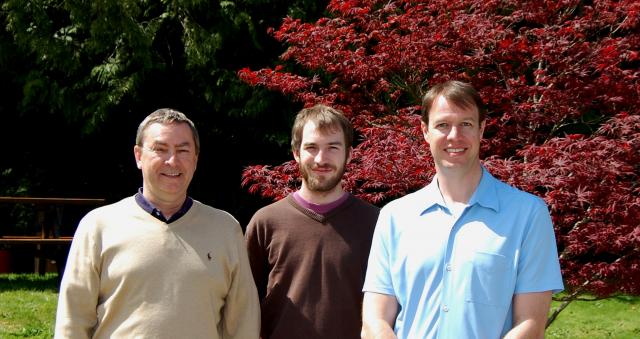Stephan Ettenauer, a UBC graduate student working with TRIUMF researcher and adjunct professor Jens Dilling, is among the elite hundred or so graduate students across Canada that have been selected to receive the prestigious Vanier Canada Graduate Scholarship, an award valued at $50,000 per year for up three years. Ettenauer was one of only about 10 students selected with research topics in the field of physics. Ettenauer hails from Vienna, Austria.
Ettenauer's research proposal is entitled, "High precision measurements of superallowed nuclear beta decays for tests of fundamental symmetries." The Nobel Prize in physics was awarded last year for the formulation of the Cabibbo-Kobayashi-Maskawa (CKM) quark-mixing matrix within the Standard Model of particle physics. The values of the CKM elements cannot be derived from first principle, but need to be determined experimentally. Ettenauer said, "Our aim is to perform high-precision measurements on superallowed beta decays to extract one of the CKM entries called V_ud. ISAC is the ideal place to study these special decays because of its high intensity beams and unique experimental capabilities. My research focuses on high precision measurements of mass differences among these decay states by using TRIUMF's Ion Trap for Atomic and Nuclear Science (TITAN)."
The Vanier Canada Graduate Scholarship (CGS) program aims to attract and retain world-class doctoral students by supporting students who demonstrate a high standard of scholarly achievement in graduate studies in the social sciences and humanities, natural sciences and engineering, and health; as well as leadership skills. The Vanier CGS program reaffirms Canada as a global centre of excellence in research and education. The program supports Canada's science and technology policy direction, which capitalizes on people, strengthens knowledge and encourages entrepreneurial advantages to build a competitive Canada. A key criterion for success in the program is demonstrated relevance to and impact on Canada's national research priorities. Ettenauer's research in nuclear physics will help advance innovations in a broad range of areas by contributing to the development of a fundamental theory and by developing the next generation of precision measurement technology.
The Vanier Canada Scholarships program is administered by the country's three federal research granting agencies - the Canadian Institutes of Health Research, the Natural Sciences and Engineering Research Council and the Social Sciences and Humanities Research Council. At full capacity, the program will support up to 500 doctoral students from Canada and abroad annually. The first cohort of 166 recipients were announced on April 30 in Ottawa. Nominees were evaluated through peer-review and selected by a board of world-renowned Canadian and international experts that includes former UBC President Martha Piper and Bombardier board chair Laurent Beaudoin.
Some people grow up loving physics. When asked about the origins of his high-calibre efforts in the field, Ettenauer said, "In fact, I was not much interested in physics at a young age, and I even remember a time at high school when I hated physics. As a teenager I was often frustrated about discussions between people of opposite opinions in which no agreement and not even mutual understanding could be reached. Out of this frustration, I became concerned with how to communicate clearly and precisely." From there, he grew interested in philosophy, mathematics, and then physics. It was in physics that he found the tools to make powerful, predictive statements about how the world works. "To some extent," he said, "I am still more interested in the logical structure of a physics argument and why we believe that it is correct (i.e., accurate) than what it actually states."
About the Vanier Scholarship, Ettenauer says it will allow him to complete his Ph.D. work in about 2-3 years without worrying about financial support. From there, he says, he hopes to find a post-doctoral placement to continue his work.
Congratulations, Stephan, and good luck!

(Left to right) Nigel Lockyer, Stephan Ettenauer, and Jens Dilling
-- By T.I. Meyer
